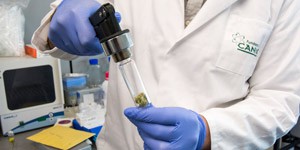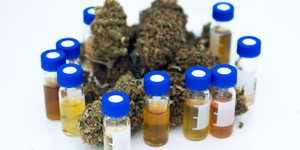By José Carlos Bouso

José Carlos Bouso is a clinical psychologist and a doctor of pharmacology. His areas of interest are psychopharmacology and the therapeutic properties of entactogens, psychedelics and cannabis. He has conducted therapeutic research with MDMA, pharmacological research with several substances of plant and synthetic origin and has also performed studies on the long-term neuropsychological effects of substances such as cannabis, ayahuasca and cocaine. He is author of the book "Qué son las drogas de síntesis" [What are synthetic drugs?], and co-author of “¿La marihuana como medicamento? Los usos médicos y terapéuticos del cannabis y los cannabinoides" [Marihuana as medicine? The medical and therapeutic uses of cannabis and cannabinoids] and "Ayahuasca y salud" [Ayahuasca and health]. His research has been published in scientific journals. He is currently the director of scientific projects at Fundación ICEERS.
When discussing the issue of the comprehensive or medicinal regulation of cannabis the main counterargument frequently heard and which mostly prevents a measured debate is that cannabis produces neuropsychiatric effects that make it a dangerous product.
Psychiatry and psychiatric drugs
The extremely low toxicity of organic cannabis is well known. The fact that there is a large density of CB1 receptors in the brain stem, the cerebral structure that regulates basic life functions such as respiration and cardiovascular functions makes it virtually impossible to die from a cannabis overdose. The only medical risks of cannabis are found in people with severe cardiovascular problems because of the increased heart rate that cannabis produces in acute conditions. But continued use creates tolerance to this effect so that the cardiac increase disappears and the possible risk is only at the start of treatment and is perfectly controllable with medical supervision. Thus, in the absence of medical risks when using cannabis, the only worry that remains is that concerning psychological and cerebral risks.
Mental illnesses are the only spectrum of diseases in medical science for which there are no reliable pathogenetic models, that is, the causes are not known in depth and so treatments are not very effective. In psychiatry, a drug is often developed first and the pathology established afterwards1. The biological model of mental illness understands them as a brain dysfunction susceptible to correction by drugs. But the evidence that:
- mental illnesses are diseases of the brain, and
- are cured with drugs are weak.
That psychiatry is in crisis is not new2. For example, treatments for depression are showing to be no more effective than placebos but with serious side effects such as suicidal thoughts and impotence. Despite these serious side effects, there are formulations for children that come in coloured tablets to make them more attractive. Many of the treatments for schizophrenia produce metabolic syndromes that become more severe than the disease itself. The subject of children causes most concern when considering regulation but it is estimated that in the US alone 3.5 million children and youths are prescribed methylphenidate (an amphetamine) and in Spain the consumption of this drug has multiplied by 20 in just 15 years in the treatment of an alleged brain disease called Attention Deficit Disorder (ADD)3. Chronic use of amphetamines is associated with alterations in mood and schizophrenia. I cite these examples with the sole aim of contextualizing:
- what we mean by psychiatric risk and
- the fact that a drug (by definition all psychotropic substances are drugs), due to the fact they alter cerebral neurochemistry (all psychotropics do) are sufficient reasons for not contemplating them in the therapeutic toolkit, especially if the drug, as in the case of cannabis, besides having psychoactive effects, has clear and obvious medical properties.
Finally, mental disorders are not diseases of the brain, although obviously a brain disorder can effectively produce mental disorders: social context, including the sociopolitical conditions, the environment in which the person and countless other variables outside the brain modulate the psychological conditions of the individual. To univocally define a mental disorder as a brain disorder is both reductionist and fallacious.
Neuropsychiatric risks of cannabis
What is clear is that cannabis, like the antidepressants, antipsychotics and amphetamines given to naughty children and other neurological drugs commonly used in medicine, act on the brain and therefore on behaviour and, to some extent, taking all the above into consideration, their neuropsychiatric risks may be assessed using scientific methodology. There are two types of neuropsychiatric effects: the neuronal or neuropsychological effects on brain structures and associated functions on the one hand and the psychiatric effects on the mental functions likely to present psychopathology or mental, particularly psychotic spectrum disorders such as, for example, schizophrenia. The former are heuristically more feasible and so techniques for this are well advanced. With the latter it is more complicated as psychiatric nosologies, especially reflected in the diagnostic manuals used internationally (DSM-V), are highly questionable4.
In order to evaluate neuropsychological function techniques such as brain imaging, MRI, tests assessing cognitive processes such as attention, memory, planning tasks, decision-making and emotion recognition are used. Most studies conclude that, under the influence of cannabis, an alteration in what is called working memory, such as remembering a phone number before dialling or repeating a series of words occurs. In habitual users this alteration is less pronounced than in regular users who have developed tolerance (sic). Although other tests have shown results, mainly on attention and memory, investigations are consistent in concluding that these deficits are mild to moderate and disappear after a short period of abstinence5. The implication of this change is obvious when handling heavy machinery, driving or studying.
Early studies on the hippocampus found brain abnormalities related to memory processes. This alteration also coincided with major psychiatric symptoms, especially in the psychotic spectrum in American studies carried out before the increasing legalization processes in the US, so the results might be due to cannabis or to secondary stress caused by legal persecution.6 Recent studies have only found these results in regular cannabis users that also had some type of associated psychiatric disorder unrelated to cannabis.7
Regarding psychiatric effects, the most serious are those related to schizophrenia. Today there is consensus but not unanimity in determining that cannabis is neither necessary nor sufficient for psychosis to appear. According to the Spanish Society of Dual Pathology, removing cannabis from the face of the earth would only reduce diagnoses of schizophrenia by 8%8. This is equivalent to making 10,000 people stop using cannabis in order to prevent a single case. The truth is that the prevalence of schizophrenia remains the same in countries regardless of the quantity of cannabis consumed and that even the legal status of cannabis does not affect the number of schizophrenia diagnoses9. What remains to be determined is the nature of the associations between cannabis use and psychosis, the clinical implications of this and which public health strategies would be most efficient to prevent them10.
Implications for medicinal use
Most of the neuropsychiatric effects occur in heavy cannabis user populations, a fact that is not easily extrapolated for medicinal use. As medicinal cannabis regulation increases, results with regard to this are becoming noticeable. For example, extensive experience with Sativex (a drug containing identical amounts of THC and CBD) demonstrates that this is not associated with dependency or long term neuropsychiatric effects11. On the other hand, as many countries increase specific laws on medicinal cannabis, relevant information about the possible neuropsychiatric effects of the medicinal use of cannabis will become increasingly available. Current studies report health improvements not only in terms of the chronically ill using cannabis, but also, surprisingly, a decrease in neuropsychiatric effects. The explanation is that the use of medicinal cannabis to reduce the stress associated with any chronic disease is accompanied by an improvement in general psychological and neuropsychological wellbeing12. In conclusion, if the risks of psychotropic drugs related to neuropsychiatric conditions are assumed, there is no reason to suspect that cannabis cannot be satisfactorily used in medicine and the risks controlled. For the moment, with regard to psychosis, studies from countries where there is medicinal regulation and where a high proportion of patients reduce or even replace anxiolytics, antidepressants and analgesics13 with prescribed medicinal cannabis are continually being published. So regulated medicinal cannabis may have some neuropsychiatric risks that can be controlled and prevented with medical supervision thus undoubtedly bring many benefits.
Bibliography
1. Goztsche PC (2014): Drugs that kill and organized crime: How Big Pharma has corrupted the health system. Barcelona: The Books of the Lynx.
2. Ona G and Bouso JC (2019): Can Psychedelics be the Treatment for the Crisis in Psychopharmacology? Preprints, 2019010249 (doi: 10.20944 / preprints201901.0249.v1).
3. Fernández Saiz LC (2018): Psychostimulants for ADHD: comprehensive analysis for a drug based on prudence. Rev. Assoc. Esp. Neuropsiq . 38 (133): 301-330. http://scielo.isciii.es/pdf/neuropsiq/v38n133/0211-5735-raen-38-133-0301.pdf
4. G. Watts (2012): Critics attack DSM-5 for overmedicalising Normal Human Behavior. BMJ. 344: E1020.
5. Lovell ME, Akhurst J, Padgett C, Garry MI, Matthews A (2019): Cognitive outcomes associated with long-term, regular, recreational cannabis use in adults: A meta-analysis. Exp Clin Psychopharmacol. doi: 10.1037 / pha0000326; RJ Tait, Mackinnon A, H. Christensen (2011): Cannabis use and cognitive function: 8-year trajectory in a young adult cohort. Addiction. 106 (12): 2195-203.
6. Bouso JC (2014): The legal bias in the neuropsychological study of addiction. JM Ruiz Sánchez de León and E. Pedrero Perez (Eds.): Neuropsychology of addiction. Madrid: Editorial Médica Panamericana, pp. 183-186.
7. Scott JC, Slomiak ST, JD Jones, AFG Rosen, Moore TM, Gur RC (2018): Association of Cannabis With Cognitive Functioning in Adolescents and Young Adults: A Systematic Review and Meta-analysis. JAMA Psychiatry. 75 (6): 585-595.
8. Szerman N (Dir.) (2012): dual pathology and psychosis: a challenge in everyday clinical practice. Madrid: Editorial Focus. http://www.patologiadual.es/docs/libro_pdual_psicosis. pdf.
9. JC Bouso and even or (20XX): contextualization of social and health effects of cannabis in Spain. In: GEPCA (Study Group for Policy Cannabis) Cannabis: A new model of regulation. Barcelona: Ediciones Bellaterra. Pp: 69-106.
10. Macleod J (2007): Cannabis use and psychosis: The Origins and Implications of an association. Advances in Psychiatric Treatment, 13 (6): 400-411.
11. Russo M, De Luca R, Torrisi M, Rifici C, Sessa E, Bramanti P, Naro A, Calabrò RS (2016): Should We care about sativex-induced neurobehavioral effects? A 6-month follow-up study. Eur Rev Med Pharmacol Sci. Jul; 20 (14): 3127-33.
12. Bouso JC (2019). Medicinal cannabis. Prohibited drug therapeutic remedy. Barcelona: Editorial Amat.
13. Ibid.


